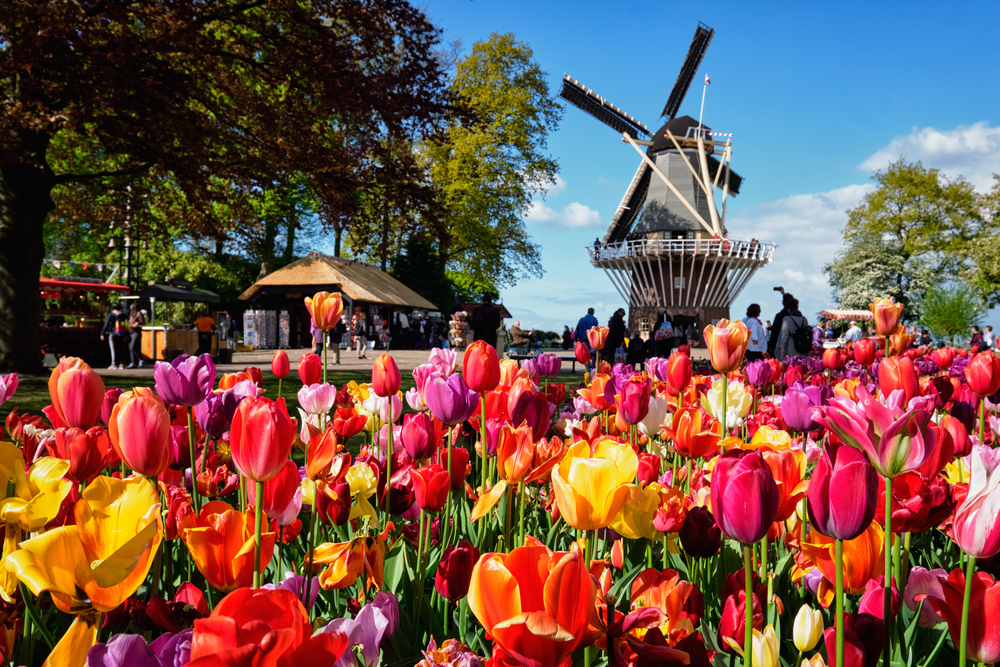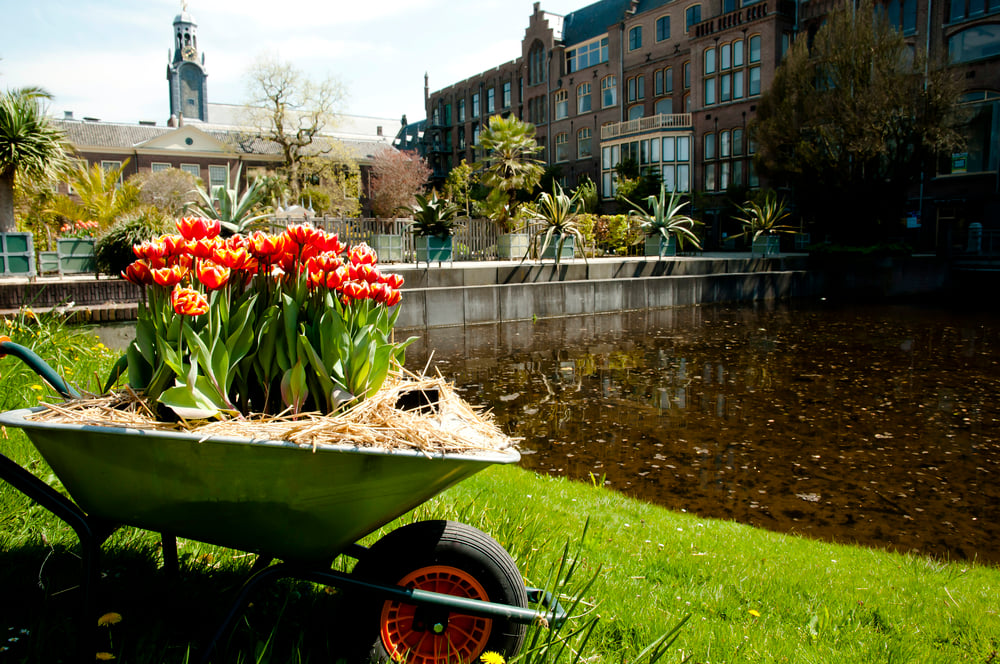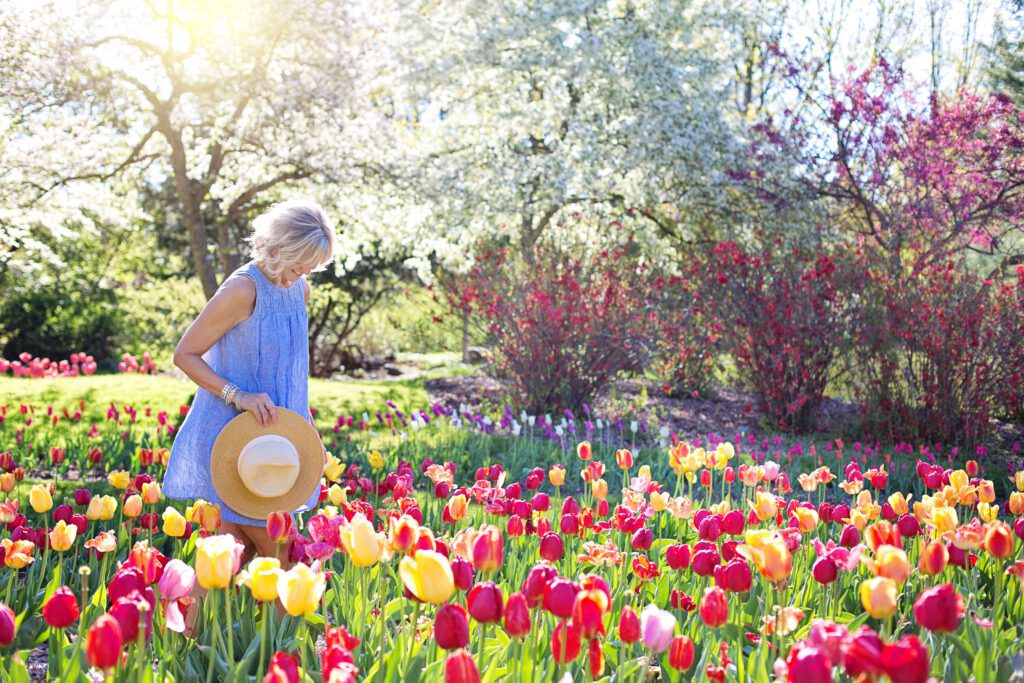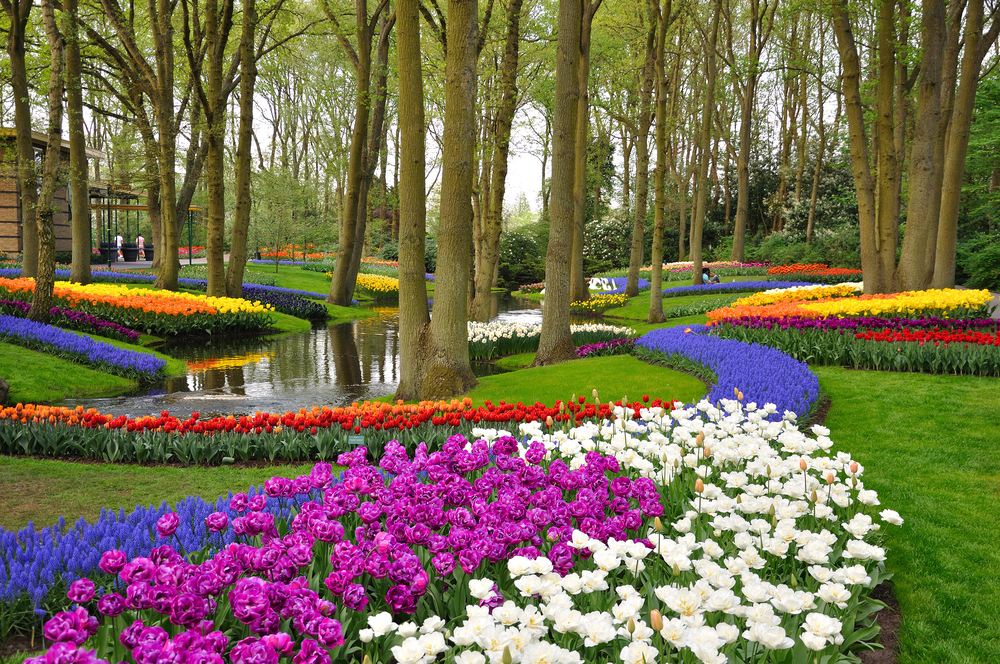When you think of the Netherlands, what do you picture? Maybe some windmills, coffee shops and even the red light district. And we’re sure the timeless tulips quickly spring to mind as well.
Every tulip season in the Netherlands, tourists flock to the Keukenhof Flower Gardens and other Dutch fields to gaze in awe at the array of flowers, bulbs and tulips on display.
READ MORE | Are the tulip fields in the Netherlands blooming?
The tulip is a quintessential Dutch symbol, but how exactly did tulips become a thing in the Netherlands? Before we look into the history of this relationship, let us find out more about the flower.

What are tulips?
The tulip is a bulbous spring-flowering plant of the lily family. Did you know this means they are also related to onions, garlic and asparagus? 🧅
Tulip flowers are usually boldly coloured, cup-shaped and incredibly symmetrical. The name “tulip” is thought to be derived from a Persian word for turban, which their shape resembles.
How did the tulips travel to the Netherlands?
No, that’s not the opener for a “chicken crossing the road”-type joke.
While tulips may be very popular in the Netherlands, it’s not their original home. They are believed to stem from the Tien Shan mountain ranges in Central Asia, where they were already being cultivated by gardeners in the Ottoman Empire for decades. 🤯
Tulips are rare and exotic plants, which means Western Europe soon became fascinated by them. They were officially introduced in the Netherlands at the end of the 16th century.
So who was responsible for the tulip transportation? Well, it’s not known for sure.
The most widely accepted story is that Oghier Ghislain de Busbecq, Emperor Ferdinand I’s ambassador to Suleyman the Magnificent, was responsible.
READ MORE | 5 ways you can tell that it’s FINALLY spring in the Netherlands
At this time, a Flemish botanist by the name of Carolus Clusius was made the director of the Hortus Botanicus in Leiden, conducting research into medicinal plants.

This is where De Busbecq comes back into the story by sending his friend Clusius a few tulips for his garden in Leiden. Ta-da! The first bulb field in the Netherlands was born.
At the beginning of the 17th century, everyone had become so besotted with tulips that people started using them as garden decoration. They soon became a major trading product in Holland and other parts of Europe.
The interest was HUGE, and bulbs were sold for unbelievably high prices.
But it wasn’t all fair trading: between 1596 and 1598, over a hundred bulbs were STOLEN from Clusius’ rare collection. Thieves! 😲

“Tulip Mania” (yes, we’re serious)
Tulpenmanie (Tulip Mania) refers to the craze that befell the Dutchies in the 17th century. They went wild for the flowers, and the brighter the better.
Clusius studied the tulips and their unique colourings for a long time — with no way of knowing that the colourings were actually caused by a virus. 🔍
READ MORE | Here’s how technology changed the iconic way the Dutch sell their flowers
Not discovered until 1931, the virus responsible was actually transferred by aphids. Nowadays, multicoloured tulips are artificially bred to look that way.
At first, people were content with exchanging seeds and bulbs, but when it became obvious that the ultra-colourful tulip bulbs were more popular, the price was hiked, and demand soared.
Believe it or not, tulips were even used as currency. In 1633, actual properties were sold for handfuls of bulbs. How does that make any “cents”?!
What about tulips today?
Even though we might not reach the hysterical heights of Tulip Mania, the Dutch affection for all things floral flourishes — for free, in some places! 👇
Tulips are still extremely popular in the Netherlands and are even celebrated at festivals.
Millions of springtime tourists flock to Keukenhof every year to marvel at the famous gardens. Elsewhere in the city, the annual Amsterdam Tulip Festival ensures the famous flower blooms all over.
Throughout the first half of April, more than 850,000 colourful (and rare) tulips can be seen in the gardens of museums, private homes, and other parts of Amsterdam.

5 fun facts about tulips in the Netherlands
1. In 1943, Dutch Princess Margriet was born in Canada’s Ottawa Civic Hospital, as the royal family fled the Netherlands to escape the war in Europe. The maternity ward where she was born had to be declared an international territory so she could inherit her Dutch citizenship from her mother, Princess Juliana. Each year as a sign of gratitude, the Dutch royal family sends 10,000 bulbs to Ottawa for the tulip festival!
2. Since 1986, the Netherlands has sent flowers to St Peter’s Basilica every Easter. This tradition started following Pope John Paul II’s visit to the country in 1985, and since then, the Vatican has decided to let the Netherlands be in charge of the Easter floral display.
3. During the tulpenmanie in the 1600s, tulips were said to have cost 10 times more than a working man’s average salary in the Netherlands, making them more valuable than many homes.
4. The Netherlands is the world’s largest commercial producer of tulips, with around three billion exported each year. Are we surprised?
5. Tasty tulips? Their petals are edible! During the Dutch famine of 1944 in WWII, people often had to resort to eating sugar beets and tulips.
So, there you have it. Now your tulip knowledge is in full bloom! Next time you see a brightly-lined field of the famous flowers, maybe you’ll imagine the kind of house a handful of tulips could buy these days…
Did you know the origin of these iconic Dutch flowers? Let us know your thoughts in the comments!





National Tulip Day at Dam Square
https://youtu.be/6o5pHiG2Sqg
Actually, I don’t think of any of the things you mentioned at the beginning. I just think about the song, ‘Under The Sea’.
Tulpes aren’t a thing in the Netherlands. This is the truth. Amersterdam isn’t the Netherlands. It’s in Holland a province. Amersterdam loves to play off of tourist thing that tourist think what is Netherlands. You go outside of Holland there isn’t going to be tuples everywhere. Holland is fake Netherlands. Where Netherlands is real thing.
Then lets also be precise in specifying that Amsterdam is in the province Noord-Holland
Nah. I think the Netherlands don’t even have that many tulips like, at all. So all of you guys are wrong except for the dude who posted about “under the sea” I love that song.